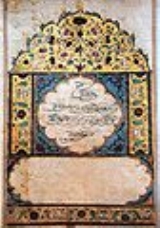
Mul Mantra
Overview
Sikh
A Sikh is a follower of Sikhism. It primarily originated in the 15th century in the Punjab region of South Asia. The term "Sikh" has its origin in Sanskrit term शिष्य , meaning "disciple, student" or शिक्ष , meaning "instruction"...
holy book, the Adi Granth
Adi Granth
Adi Granth is the early compilation of the Sikh Scriptures by Sri Guru Arjan Dev Ji, the fifth Sikh Guru, in 1604. This Granth is the Holy Scripture of the Sikhs. The tenth Sikh Guru, Guru Gobind Singh added further holy Shabads to this Granth during the period 1704 to 1706...
. It is a series of affirmations
Affirmations (New Age)
Affirmations in New Age and New Thought terminology refers primarily to the practice of positive thinking—fostering a belief that "a positive mental attitude supported by affirmations will achieve success in anything." More specifically an affirmation is a carefully formatted statement that should...
and is the basis of Sikh theology. The Mul Mantar is the first composition of Guru Nanak and the origin of the Adi Granth
Adi Granth
Adi Granth is the early compilation of the Sikh Scriptures by Sri Guru Arjan Dev Ji, the fifth Sikh Guru, in 1604. This Granth is the Holy Scripture of the Sikhs. The tenth Sikh Guru, Guru Gobind Singh added further holy Shabads to this Granth during the period 1704 to 1706...
. The Adi Granth begins with the Mul Mantar and it occurs more than one hundred times throughout the text. The Mul Mantar is the most widely known part of Sikh scripture but it has posed a challenge to translators.
ੴ ਸਤਿ ਨਾਮੁ ਕਰਤਾ ਪੁਰਖੁ ਨਿਰਭਉ ਨਿਰਵੈਰੁ ਅਕਾਲ ਮੂਰਤਿ ਅਜੂਨੀ ਸੈਭੰ ਗੁਰ ਪ੍ਰਸਾਦਿ ॥
॥ ਜਪੁ ॥
ਆਦਿ ਸਚੁ ਜੁਗਾਦਿ ਸਚੁ ॥ ਹੈ ਭੀ ਸਚੁ ਨਾਨਕ ਹੋਸੀ ਭੀ ਸਚੁ ॥੧॥
- Transliteration: ikk ōankār sat(i)-nām(u) kartā purakh(u) nirpà'u nirver(u) akāl mūrat(i) ajūnī sepàŋ gur-prasād(i) ॥
॥ jap(u) ॥
ād(i) sach(u) jugād(i) sach(u) ॥ he pì sach(u) ॥ nānak hōsī pì sach(u) ॥1॥
- EnglishEnglish languageEnglish is a West Germanic language that arose in the Anglo-Saxon kingdoms of England and spread into what was to become south-east Scotland under the influence of the Anglian medieval kingdom of Northumbria...
: One God, the true name, the creator, without fear, without hatred, timeless, self-existent, he blesses us with guru for true teachings.
True at the beginning, true through the ages, is yet true, O Nanak, will be true in the future.
- Some consider the Mul Mantar proper to end at "gur prasad"
- The small letters are not etymologically part of the word but are included in the Guru Granth Sahib for vocalization purposes.
Mul means root, it has a similar etymological origin to the Punjabi language
Punjabi language
Punjabi is an Indo-Aryan language spoken by inhabitants of the historical Punjab region . For Sikhs, the Punjabi language stands as the official language in which all ceremonies take place. In Pakistan, Punjabi is the most widely spoken language...
word Muli which means white radish.
Discussions

